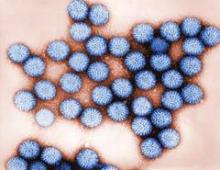Widespread uptake of rotavirus vaccine in the United States saved an estimated 1.5 million diarrhea-related health care visits in 4 years, as well as $924 million in associated health care costs, according to a multiyear analysis.
Rotavirus-related hospitalizations fell by as much as 94% in the years after the Advisory Committee on Immunization Practices (ACIP) first recommended routine use of pentavalent rotavirus vaccine (RV5), reported Dr. Eyal Leshem and his associates at the Centers for Disease Control and Prevention in Atlanta.
"Reductions in rotavirus and all-cause diarrhea-associated hospitalizations in U.S. children during the 2007-2008 and 2008-2009 rotavirus seasons have been well documented," the researchers said. "Our results demonstrate that these declines were sustained and were greater in the subsequent rotavirus seasons in 2009-2010 and 2010-2011."
The retrospective study cohort included more than 406,000 commercially insured children aged 5 years and younger from 37 U.S. states, the researchers said (Pediatrics 2014;34:15-23). By December 2010, 58% of the cohort had received at least one dose of RV5 and 5% had received at least one dose of monovalent RV1 vaccine.
In vaccinated children, rotavirus-related hospitalizations fell by 94% during 2009 through 2011, compared with the prevaccine period 2001 through 2006, the investigators said. Decreases were sustained across age groups, ranging from 87% in 1-year-olds to 81% in 4-year-olds. And in unvaccinated children, rotavirus-related hospitalizations also declined by 25%-77%.
"Both RV5 and RV1 were highly effective in preventing rotavirus-coded hospitalizations, and also prevented diarrhea-associated hospitalizations and emergency department visits," added Dr. Leshem and his associates. "The protection from RV5 vaccination against rotavirus-coded hospitalizations was sustained at a high level through 4 years of life, with no indication of waning immunity."
The study received no external funding, and the authors reported having no conflicts of interest.


